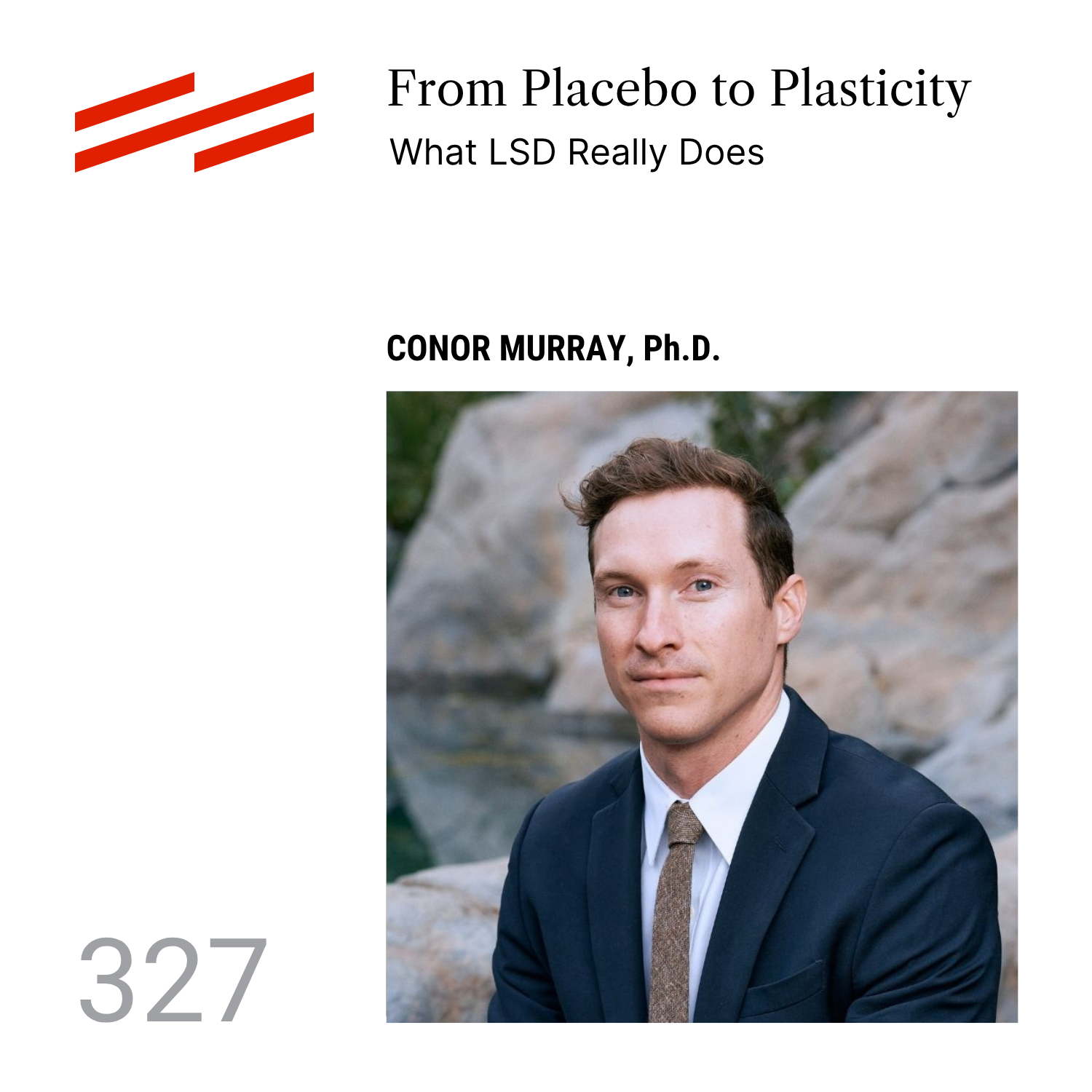
From Placebo to Plasticity: What LSD Really Does – Conor Murray, Ph.D.
🤖 AI Summary
Overview
This episode dives into the neuroscience of LSD microdosing with Dr. Conor Murray, exploring its effects on neural complexity, its potential therapeutic applications for depression and addiction, and the broader implications for brain plasticity. Dr. Murray also discusses his citizen neuroscience platform, Psynautics, and its role in advancing psychedelic research.
Notable Quotes
- You might think only high doses of psychedelics show interesting brain effects, but even microdoses of LSD can increase neural complexity.
– Dr. Conor Murray, on the unique neurological impact of microdosing.
- Addiction is a maladaptive plasticity disorder. Can psychedelics disrupt that plasticity and reset the brain?
– Dr. Conor Murray, on the potential of psilocybin for treating cocaine addiction.
- Microdosing may act more like vitamins for your neurons than a traditional drug.
– Dr. Conor Murray, on the wellness potential of low-dose psychedelics.
🧠 Neural Complexity and Microdosing
- Dr. Murray’s research shows that even low doses of LSD (as small as 13 micrograms) can increase neural complexity, a marker of brain flexibility.
- Unlike stimulants like methamphetamine or THC, LSD uniquely induces this effect, supporting the idea of psychedelic exceptionalism.
- Neural complexity changes may correlate with improved mental clarity and behavioral flexibility, though more research is needed to link these effects to clinical outcomes.
🍄 Microdosing vs. Macrodosing
- Microdosing LSD appears to have a sweet spot
around 13 micrograms, enhancing mental clarity and reward processing without inducing perceptual changes.
- Higher doses may diminish these benefits, suggesting that microdosing could be more effective for certain therapeutic or cognitive goals.
- Dr. Murray emphasizes the need for further studies to determine whether microdosing leads to lasting brain changes or only provides temporary benefits.
🧬 Mechanisms of Healing: BDNF and Inflammation
- Microdosing LSD has been shown to increase BDNF (Brain-Derived Neurotrophic Factor), a precursor to neuroplasticity, even at doses as low as 5 micrograms.
- Dr. Murray speculates that psychedelics might also act as anti-inflammatory agents, potentially addressing chronic inflammation—a root cause of many diseases.
- These mechanisms could explain the broad wellness benefits reported by microdosing users, from improved mental health to enhanced cognitive function.
💊 Psilocybin for Cocaine Addiction
- Dr. Murray is leading a pilot study on psilocybin-assisted therapy for cocaine use disorder, aiming to address the lack of FDA-approved treatments for stimulant addiction.
- The study explores whether psilocybin can disrupt the maladaptive brain plasticity that underlies addiction, particularly the heightened response to drug-related cues.
- He highlights the importance of integrating pharmacological interventions with behavioral therapy and environmental changes to prevent relapse.
🔬 Citizen Neuroscience and Psynautics
- Dr. Murray’s platform, Psynautics, enables individuals to participate in neuroscience research using at-home EEG devices.
- Current studies include tracking brain changes before and after microdosing protocols, with participants receiving personalized brain data reports.
- This approach democratizes research, allowing broader participation and potentially accelerating discoveries in psychedelic science.
AI-generated content may not be accurate or complete and should not be relied upon as a sole source of truth.
📋 Episode Description
In this episode of The Psychedelic Podcast, Paul F. Austin speaks with Dr. Conor H. Murray, a neuroscientist at UCLA whose research explores how psychedelics affect the brain.
Find full show notes and links here:
https://thethirdwave.co/podcast/episode-327/?ref=278
Conor shares insights from his placebo-controlled LSD microdosing study revealing measurable increases in neural complexity, suggesting unique neurological benefits even at sub-perceptual doses. He and Paul discuss what these findings mean for depression, addiction, and brain plasticity, as well as the future of citizen neuroscience through Conor’s platform Psynautics. They also touch on his ongoing psilocybin study for cocaine use disorder and why low-dose research may hold keys to understanding consciousness itself.
Interested in participating in Dr. Murray’s Microdosing Study? Get 10% Off Your Enrollment!
Use code WAVE3 to receive 10% off your study kit. https://www.psynautics.com/microdosing
Conor Murray is a neuroscientist specializing in altered states of consciousness at UCLA. He is also the founder of Psynautics, the world's first citizen neuroscientist platform built for testing hypotheses related to altered states of mind and brain, from meditation to microdosing. His scientific expertise spans from the neurobiology of addiction to the effects of cannabis and psychedelics on the brain.
Highlights
- How Dr. Murray entered psychedelic research by chance
- What LSD microdosing reveals about neural complexity
- The “sweet spot” around 13 micrograms for mental clarity
- Why placebo effects don’t fully explain brain changes
- Microdosing vs macrodosing in neuroplastic outcomes
- BDNF, inflammation, and the mechanisms of healing
- Psilocybin’s potential for cocaine use disorder
- How environment influences addiction and relapse
- The rise of citizen neuroscience and DIY EEG studies
- Where psychedelic science is headed next
Episode Links
- Conor H. Murray, PhD Personal website
- Psynautics (Citizen Neuroscience Project)
- Psynautics Microdosing Study (Use code WAVE3 to receive 10% off your study kit)
Episode Sponsors
